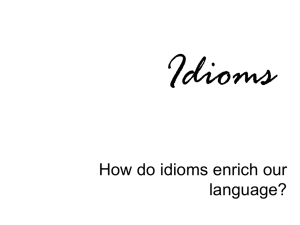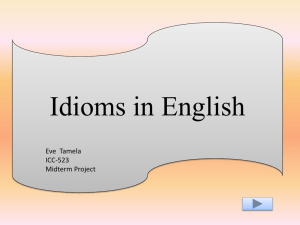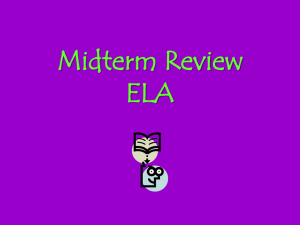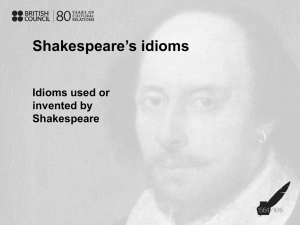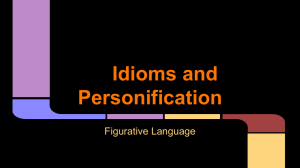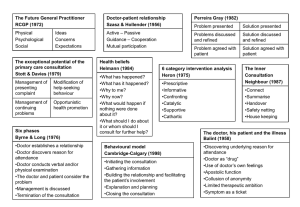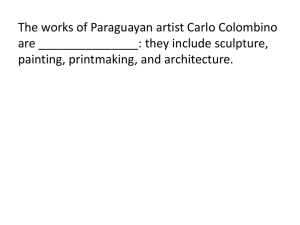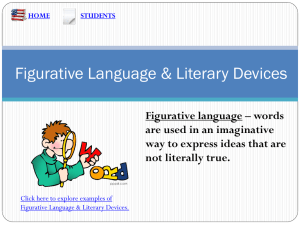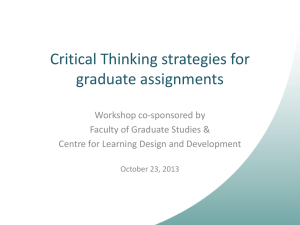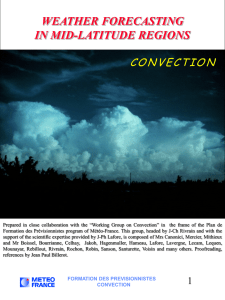POWERPOINT JEOPARDY - Madison County Schools
advertisement
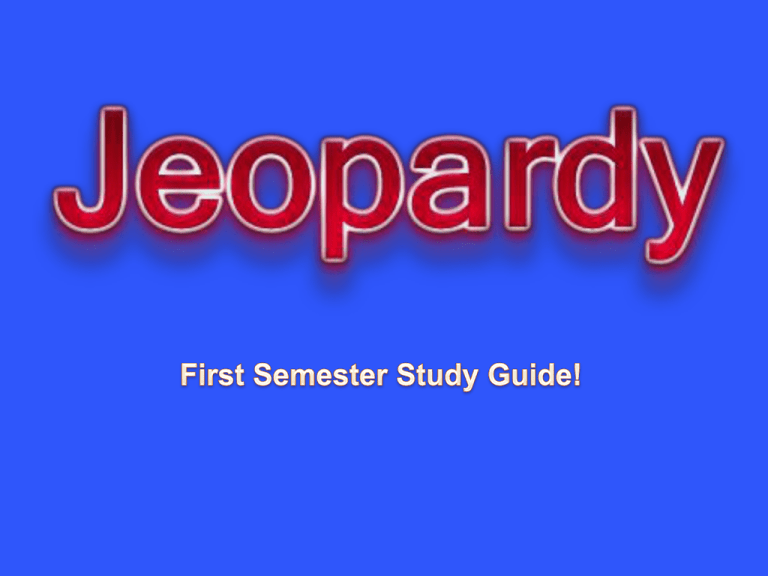
Terms Literary Devices Sound Devices Text Structure Strategies 10 10 10 10 10 20 20 20 20 20 30 30 30 30 30 40 40 40 40 40 50 50 50 50 50 Question 1 - 10 • This is a shorter way to tell about a passage. You should include important details or events and leave out details that are unimportant. This is the who, what, when, where and why, but it leaves out the “fluff.” – Answer:________ • Which of the following statements is too specific to be included in (answer to the first part above) of “Titee”? – A. A young schoolboy who preferred a natural education to a school book education began to act unusual at school and at home. – B. He disgraced himself by punctuating the eye of a classmate with his fist. – C. He disappeared one evening and his family’s search ended when they found him hurt by the railroad tracks. – D. After finding the boy, it was revealed that his unusual behavior was due to his kind actions toward a homeless man. • Answer: __________ Answer 1 – 10 • Summary • B. He disgraced himself by punctuating the eye of a classmate with his fist. Question 1 - 20 • (Two part answer) • In a plot sequence this is the event where there is a peak in story or a turning point. – Answer:________ • In “Titee” which of the following quotes best supports the high point of the story? – A. Titee shivered as the wind swept round the freight cars. There isn’t much warmth in a jersey coat. “Wish ‘twas summer,” he murmered. – B. Tiete was in disgrace again. In spite of his battered appearance, a scolding from the principal, and punishment from his mother. – C. “My old man. Please, don’t go home till I see him. I’m not hurting much.” – D. “There’s a crown in heaven for that child,” said the charity officer. Answer: __________ Answer 1 – 20 • Climax • C. “My old man. Please, don’t go home till I see him. I’m not hurting much.” Question 1 - 30 – Two part question… • When you read a passage that does not have enough detail to draw a conclusion, you can determine the suggestion the author is making by drawing an ___. Answer:_______ • Which of the following quotes conveys that Titee can be impulsive? A. He knew when the crawfish were plentiful in the Claiborne and Marigny canals. B. The next day, Titee was late for school, which was unusual. His teacher looked reprovingly at him when he came in during arithmetic class. C. “My old man. Please, don’t go home till I see him. I’m not hurting much.” D. “I tell you I didn’t!” and Titee’s fist planted a punctuation mark on his comrade’s eye. Answer: ______ Answer 1 – 30 • Inferences • D. “I tell you I didn’t!” and Titee’s fist planted a punctuation mark on his comrade’s eye. Question 1 - 40 • This is the message the author tries to convey. It can be applied to all of mankind. When expressing this message in literature it must be written as a complete thought (sentence). • Answer 1:______________ • How does the idiom used in paragraph 27 reflect the theme of “Titee”? a. The idiom compares the life of the homeless to heaven. b. The idiom shows that Titee’s actions were bold and unexpected. c. The idiom conveys that Titee’s actions are building heavenly rewards. d. The idiom shows that God loves Titee most of all and will crown his head in heaven. Answer: ________ Answer 1 – 40 • Theme and Central Idea • C. The idiom conveys that Titee’s actions are building heavenly rewards. Question 1 - 50 • Give all of the reasons an author writes. HINT: there are 5! PIEED Answer: __, __, __, __, &__. • What is the author’s purpose for using a Southern dialect in “Titee”? • A. To entertain the reader with Titee’s country accent. • B. To emphasize that education has little to do with compassion. • C. To prove that Titee was uneducated. • D. To inform the reader of how Southerners speak. • Answer: _______ Answer 1 – 50 • Answer: – Persuade – Inform – Entertain – Explain – Describe • Answer: – B. To emphasize that education has little to do with compassion. Question 2 - 10 • Make an inference based on the context clues: • Had it not been for Titee and his efforts to feed the poor, homeless man, it is possible that the cave could have become the man’s interment site, a pitiful grave for a pitiful man. 1. • • • • 2. a. b. What is the best meaning of interment? A. an entrance B. A burial site C. A sad feeling D. a soup kitchen Answer:____ Based on the your answer to #1, what context clue best helped you know the meaning of interment? Homeless c. Pitiful Grave d. Cave Answer:___ Answer 2 – 10 • B. burial site • B. grave Question 2 - 20 • Language that appeals to your senses is called ________. (Think: What are your five senses?) Answer:________ • Which of the following sentences from “Tiny Troubles” is the least descriptive? • A. The loud sound brings retribution; knowing she’s in trouble, she lowers her head slightly but then looks up as if totally innocent claiming, “Daddy did it.” • B. Her big blue eyes danced with wonder and excitement as she watches the colored lights and numerous, festive decorations go onto the tree. • C. Stolen glances are just enough as she tiptoes into the room for a closer look, and her pudgy little fingers reach for the irresistible beauty of the delicate ornaments. • D. Lights, ornaments, garland, and water flood the floor around her as she fumbles with ornaments on a few of the fallen branches. Answer: ______ Answer 2 – 20 • Sensory images or imagery • A. The loud sound brings retribution; knowing she’s in trouble, she lowers her head slightly but then looks up as if totally innocent claiming, “Daddy did it.” Question 2 - 30 • What are the two ways you can make a comparison in literature? How can you distinguish between the two? Answer:____ In paragraph 13 of “Titee,” what is the purpose of the simile “He fretted and fumed like a storm in miniature”? a. b. c. d. Titee’s frustration of being inside is being compared to the storm that is brewing outside. Titee’s words are being compared to the clash of lightening during a storm. Titee’s tardiness is compared to a storm that slowly rolls onto shore. Titee’s actions are being compared to a storm that is silenced at night. Answer:_________ Answer 2 – 30 • Simile and Metaphor • Simile uses like/as • Metaphor uses is • A. Titee’s frustration of being inside is being compared to the storm that is brewing outside. Question 2 - 40 • What is the text structure of the passage below? Since Mrs. Autrey drank too much coffee last night, she didn’t want to go to sleep. So, she decided to watch a late movie even though the next day was a school day. The next morning she was so sleepy that she didn’t want to get up and go to work. She stayed in bed until her husband threatened to pour ice water over her head to get her up. Since she was so groggy, she moved at a turtle’s pace, was late to work, and missed first period. Consequently, Mr. Lawrence called her into the principal’s office and threatened to fire her if she was ever late to school again. a. Problem/solution c. Order of importance b. Chronological d. Cause/effect Answer:___ Answer 2 – 40 • D. Cause and effect Question 2 - 50 • These two literary devices have to do with the combination of opposites. What are they? – Answer: ___________ and _____________ • Which literary device is used in the following sentence from Aesop’s “The Old Woman and the Physician”? • “Before I lost the use of my eyes, I saw in my house various items and valuable goods, but now, though he swears I am cured of my blindness, I am not able to see a single thing in it.” a. Oxymoron c. Irony b. Symbolism d. Personification Answer:___ Answer 2 – 50 • Irony (fire station catches fire) • Oxymoron (deafening silence, original copies, liquid gas, jumbo shrimp) • c. Irony Question 3 - 10 • Which literary sound device is used in the following passage? The clown’s clatter made the kids cackle when he dropped the metal ball at the circus. He had orange hair that was a fringe of fire around a bald top. His freckled face looked fierce with the flecks of fur atop his bushy brow. His nubby nose was a tiny red ball, and his mouth dangled downward into a devilish grin. His shoes were a yellow hue and huge. The clown was a frightfully funny sight. a. Alliteration c. Internal rhyme b. Assonance d. Onomatopoeia Answer:___ Answer 3 – 10 • A. Alliteration Question 3 - 20 • Use of words to imitate sounds. Answer 3 – 20 • Onomatopoeia Question 3 - 30 • This is the repetition of a vowel sound. Give an example Answer 3 – 30 • Assonance • The rain in Spain stays mainly on the plain. Question 3 - 40 • A similar ending sound either within a single line of poetry or at the end of multiple lines of poetry is called a _ _ _ _ _. Answer 3 – 40 • Rhyme Question 3 - 50 • What is it called when we label each end of the poetry line in order to identify the pattern? • I kneed to sturdy harder. • I'm knot doing very well. • My math and reeding are pritty sad, • Most wurds I kannot spell Answer 3 – 50 • Rhyme Scheme • ABCB Question 4 - 10 • Refer to the excerpt from “Tiny Troubles,” which quote does not convey the theme of the story? • A. Even after she is banned from the room, she peeks around the corner of the door and smiles mischievously when she is caught. • B. The loud sound brings certain retribution; knowing she’s in trouble, she lowers her head slightly but then looks up as if totally innocent claiming, “Daddy did it.” • C. Her tiny hands itch with help, but she is much too young for tree trimming. • D. The tree wobbles precariously in its stand before crashing to the floor almost on top of the small imp covering at its base. • Answer:____ Answer 4 – 10 • D. The tree wobbles precariously in its stand before crashing to the floor almost on top of the small imp covering at its base. Question 4 - 20 • A text structure that contains ample (plenty of) use adjective and vivid verb Answer 4 – 20 • Description or descriptive Question 4 - 30 • What is the best summary of paragraph 1 of “The Old Woman and the Physician”? • A. A deal of healing was made between a blind woman and a doctor; under the pretense of curing her, he stole household items. • B. After stealing all that the doctor wanted, he cured her, but she would not pay him and he took her to court. • C. The woman insists that she is still blind because she was not able to see a single good in her home that she could “see” before the doctor healed her. • D. A doctor and a woman made a deal in which the doctor would be paid if he healed the woman of blindness. As he worked to heal her eyes, he stole from her home until there was nothing remaining that he wanted. After she was healed and realized that her goods were gone, she refused to pay him, and the doctor took her to court. In court, the woman claimed to be blind because she could not longer see her possessions. Answer 4 – 30 • A. A deal of healing was made between a blind woman and a doctor; under the pretense of curing her, he stole household items. Question 4 - 40 • When an author places events in the order in which they occur or happen this is what text structure? Answer 4 – 40 • Sequential – numbered • Chronological – time Question 4 - 50 • In this text structure the author explains the process of or tells how to do something. Answer 4 – 50 • Procedure/Process Question 5 - 10 • Trace means to _ _ _ _ _ _ _. Answer 5 – 10 • Outline Question 5 - 20 • _ _ _ _ _ _ _ to break it down. • Back it up with _ _ _ _ _ _ _. Answer 5 – 20 • Analyze • Support Question 5 - 30 • When you think about the future, you make a __________. Answer 5 – 30 • Prediction Question 5 - 40 • For what type of text do you use the TOASTTT strategy? What does TOASTTT stand for? Answer 5 – 40 • • • • • • • • Poetry Title Own words (summarize) Analyze Shift Tone Theme Title (another appropriate title) Question 5 - 50 • For what type of text do you use the UNRAAVEL strategy? What does UNRAAVEL stand for? Answer 5 – 50 • • • • • • • • • All passages and short stories Underline the title Now predict the passage Run through and number the paragraphs Are you reading the questions? Are you circling the words? Venture (read) through the passage Eliminate wrong answers Let the questions be answered



